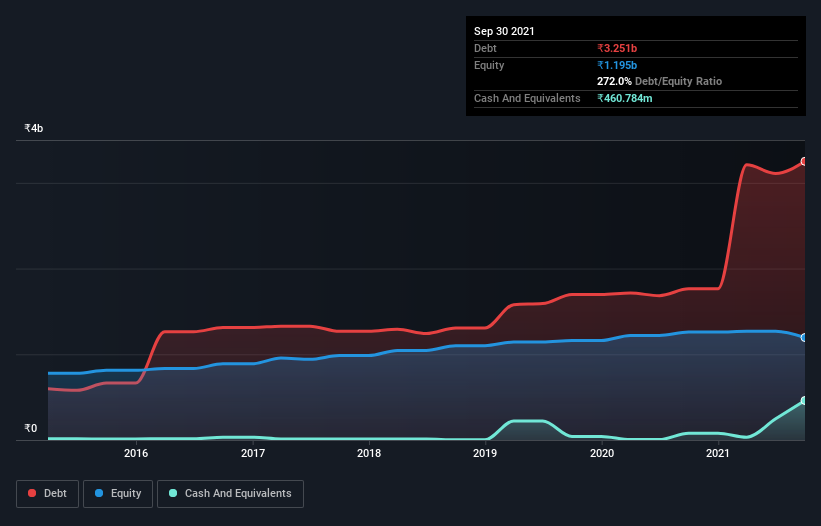Legendary fund manager Li Lu (who Charlie Munger backed) once said, 'The biggest investment risk is not the volatility of prices, but whether you will suffer a permanent loss of capital.' It's only natural to consider a company's balance sheet when you examine how risky it is, since debt is often involved when a business collapses. As with many other companies Cineline India Limited (NSE:CINELINE) makes use of debt. But the more important question is: how much risk is that debt creating?
When Is Debt A Problem?
Debt is a tool to help businesses grow, but if a business is incapable of paying off its lenders, then it exists at their mercy. In the worst case scenario, a company can go bankrupt if it cannot pay its creditors. However, a more usual (but still expensive) situation is where a company must dilute shareholders at a cheap share price simply to get debt under control. By replacing dilution, though, debt can be an extremely good tool for businesses that need capital to invest in growth at high rates of return. The first thing to do when considering how much debt a business uses is to look at its cash and debt together.
View our latest analysis for Cineline India
What Is Cineline India's Debt?
As you can see below, at the end of September 2021, Cineline India had ₹3.25b of debt, up from ₹1.76b a year ago. Click the image for more detail. However, it also had ₹460.8m in cash, and so its net debt is ₹2.79b.

A Look At Cineline India's Liabilities
According to the last reported balance sheet, Cineline India had liabilities of ₹400.3m due within 12 months, and liabilities of ₹3.17b due beyond 12 months. Offsetting this, it had ₹460.8m in cash and ₹168.9m in receivables that were due within 12 months. So its liabilities outweigh the sum of its cash and (near-term) receivables by ₹2.95b.
This deficit is considerable relative to its market capitalization of ₹2.99b, so it does suggest shareholders should keep an eye on Cineline India's use of debt. This suggests shareholders would be heavily diluted if the company needed to shore up its balance sheet in a hurry. When analysing debt levels, the balance sheet is the obvious place to start. But it is Cineline India's earnings that will influence how the balance sheet holds up in the future. So when considering debt, it's definitely worth looking at the earnings trend. Click here for an interactive snapshot.
In the last year Cineline India wasn't profitable at an EBIT level, but managed to grow its revenue by 59%, to ₹319m. With any luck the company will be able to grow its way to profitability.
Caveat Emptor
Despite the top line growth, Cineline India still had an earnings before interest and tax (EBIT) loss over the last year. Indeed, it lost ₹78m at the EBIT level. When we look at that and recall the liabilities on its balance sheet, relative to cash, it seems unwise to us for the company to have any debt. So we think its balance sheet is a little strained, though not beyond repair. We would feel better if it turned its trailing twelve month loss of ₹240m into a profit. In the meantime, we consider the stock very risky. There's no doubt that we learn most about debt from the balance sheet. However, not all investment risk resides within the balance sheet - far from it. For example, we've discovered 6 warning signs for Cineline India (2 are a bit unpleasant!) that you should be aware of before investing here.
If, after all that, you're more interested in a fast growing company with a rock-solid balance sheet, then check out our list of net cash growth stocks without delay.
New: AI Stock Screener & Alerts
Our new AI Stock Screener scans the market every day to uncover opportunities.
• Dividend Powerhouses (3%+ Yield)
• Undervalued Small Caps with Insider Buying
• High growth Tech and AI Companies
Or build your own from over 50 metrics.
Have feedback on this article? Concerned about the content? Get in touch with us directly. Alternatively, email editorial-team (at) simplywallst.com.
This article by Simply Wall St is general in nature. We provide commentary based on historical data and analyst forecasts only using an unbiased methodology and our articles are not intended to be financial advice. It does not constitute a recommendation to buy or sell any stock, and does not take account of your objectives, or your financial situation. We aim to bring you long-term focused analysis driven by fundamental data. Note that our analysis may not factor in the latest price-sensitive company announcements or qualitative material. Simply Wall St has no position in any stocks mentioned.
About NSEI:CINELINE
Cineline India
An entertainment company, engages in the theatrical exhibition and allied activities business under the Movie MAX brand name in India.
Adequate balance sheet and slightly overvalued.
Market Insights
Community Narratives



